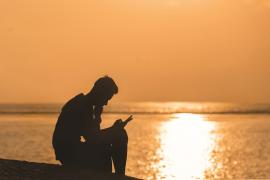An Interview with Nancy Cheever, PhD
Nancy Cheever, PhD, is a professor and chairperson in the Communications Department at California State University, Dominguez Hills, and the 2018 Presidential Outstanding Professor Award honoree. A background as a newspaper and magazine journalist with keen observation skills and a degree in psychology led her to become a media psychology researcher and consultant studying how media and technology affect people. Her research on smartphone addiction has been featured on 60 Minutes, America Inside Out on the National Geographic Channel, and Good Morning America.
What led you to your field of study?
I think it all started when I was a journalist observing how the public interacts with information and are affected by it. That kind of also led to my interest in the use of different media. My current research is on smartphones, but I’ve also done research on television and other content. I was trying to imagine how the words I was writing were impacting people. It’s kind of a powerful thing when you think about it. Media is a driving force behind how we shape the public’s understanding of how things work.
And then in graduate school I was interested in looking at representation of women in the media. As a professor, I got involved in an interdisciplinary group doing work in the area of media in psychology.
The rise of smartphones has presented a challenge for camps in determining how much, if any, cell phone use they will allow during summer camp. It seems to be a particularly important issue given the apparent connection between smartphone use and anxiety. Can you talk a little bit about your research in that area?
I’ve done a couple different studies. In 2014, we did an experiment on two groups of college students and took the phones away from half of them; the other half were asked to turn their phones off and put them away. They all had to sit quietly in an auditorium for an hour and 15 minutes with no stimuli. We did a post survey in which we asked them about their smartphone use. What we found was the participants who were moderate to heavy smartphone users got significantly more anxious the longer they went without their phones.
In the second study, we told a group of college students they were going to take a test and we needed to take their smartphones away. We asked them to leave their ringers on to mimic a natural environment and put their phones on the table behind them. I left the room and a lab tech took over the test. We connected the participants to a sensor to measure their perspiration and heart rate. Those two things combined measured physiological arousal. When someone perceives a threat there is an increase in cortisol — in ancient times when an animal came charging to eat you, that was the fight or flight response needed for survival. We see that same response in people when their phones go off, whether it’s a ring or a text message. They respond in the same way as if an animal were coming to attack them. Being in that state is really not good for us. We’re only supposed to be in an anxiety state for a short period of time, but in this study the students perceived their phones as a lasting threat because they couldn’t answer them.
In general, what we’re seeing is that those who are heavy to moderate smartphone users tend to exhibit much higher levels of stress than those who are light users.
What are the physical implications of that kind of anxiety on the brain and other parts of the body?
We don’t know about the prolonged effects yet because this is a new phenomenon, but people who experience stress all the time often have sleep disorders and other medical issues such as hypertension and headaches. Those who react negatively to not being able to check their phone may exhibit OCD symptoms and depression. They can exhibit separation anxiety, which we used to say was children separating from their parents, but now we’re attaching that to a device. Also, antisocial personality disorder has been linked to that type of anxiety, as well as paranoid personality disorders — it’s really not good.
Over the last decade, anxiety has overtaken depression as the most common reason college students seek counseling services. In your opinion, is the prevalence of smartphones a contributing factor to that?
I believe smartphone use has contributed to the increase in anxiety among college students. Because it is such a ubiquitous tool in their lives, and they’re expected to be available 24/7, the smartphone pressures them to be constantly connected. This can cause added stress, in addition to the known anxiety caused when they aren’t able to use their devices.
What’s the next step in research for you?
I think the next thing I’m going to do is research on adolescents. Everyone so far has been over the age of 18, so we’re going to do the same studies on teenagers.
You went to summer camp as a kid, right? Looking back, what sticks out most in your mind about your time at camp? I’m guessing it has nothing to do with the presence of technology.
Yes, in Ashland, Massachusetts. I can’t imagine what it would have been like if I had this constant yearning to interact with some technological device. I think it would have made it much less enjoyable. I truly enjoyed being out in nature and the camaraderie with other campers. I remember cooking was part of our chores, and I found out I was really good at archery. It was a great experience, and I have good memories to this day. I can’t imagine kids today trying to have an enriching experience at camp but also thinking about their smartphones all the time.
What advice do you have for camp directors and owners, in other words camp policymakers, with regard to creating their policies surrounding smartphones and other smart technology at camp?
I’m very familiar with the literature in this area. I think the first thing that’s so important is to get the message out to parents that they have to prime their children before they go to camp. Of course you’re going to have some sort of policy where cell phones are not allowed, or only allowed for short periods of time, but to lessen the effects of the shock to the kids, it’s important to encourage parents to start talking about it weeks before they get there. Parents need to clearly communicate to their children what’s going to happen. It’s also important that they practice by taking away their kids’ phones for a few hours a day. It’s vital to start that behavioral conditioning. You start with a couple minutes, then half an hour, then a couple of hours. Make sure the kids are turning their phones completely off at night. It can be like their teddy bear. Some kids are so attached to their phones that when they wake up, it’s the first thing they think about. Taking the phone away at night is a great start, then during the day as well. That will help kids be better prepared once they get to camp.
Dealing with cell phone-related anxiety at camp, especially given those camps with no-cell-phone-allowed policies, is a very real issue. What advice can you offer camp directors, counselors, and other camp staff on how they can help children and adolescents cope without smartphones and other new technologies?
There will be some kids who will adapt quickly. They’ll see their friends from last year and forget about it. On the other end, there will be kids who are extremely anxious, moody, and sad, and who will exhibit that behavior for as long as they can. It’s important to recognize how they’re feeling and to talk about it with them. Ask them about their feelings. Let them know you’re sensitive to how they’re feeling, but don’t give in on the no phones. That would set a precedent and is not good for the other campers.
Talk it through with your anxious camper. Ask, “What do you feel you’re missing out on? What is it that’s so important?” There are some kids who have something going on online all the time during the day at home. They don’t want to miss out on anything with their friends.
Fill their day with lots of activities. That will shift their attention away from their smartphones. They will slowly start to feel better. They all do. It’s very rare that someone is so dependent on their phone that they have such a severe meltdown they have to go home over it. Usually, after a couple of days, children will be okay.
Anything else you think is important for those in the camp community to know about the effects of smartphones on people and communication?
We don’t really know what the long-term effects are. We know the short-term effects are significant. If you just look at distracted driving, for instance. Most distracted driving accidents are from smartphone use. I see it constantly. For public health, it’s very alarming. There are so many more accidents and deaths because of distracted driving.
The other thing is just the way that people are communicating today. We talk about millennials, but it’s also the next generation coming up. We see it with our students at the university. Even the journalism students would rather conduct interviews over email; they don’t want to talk to anyone face to face. In jobs there’s a lot of turnover — many don’t participate in meetings; they’d rather interact with a screen.
Any communication that involves a device or some sort of technology is not real. It’s real in the way that it feels, but not for meaningful connections. It’s really important for kids to understand that. They don’t get the difference between mediated communication and real, face-to-face communication. With the former you get no visual cues. Things can be easily miscommunicated or misunderstood. I think it’s very important in the end that parents acknowledge their kids’ cell phone use and try to limit it as much as possible. It’s necessary if we want to raise healthy, anxiety-free citizens.


